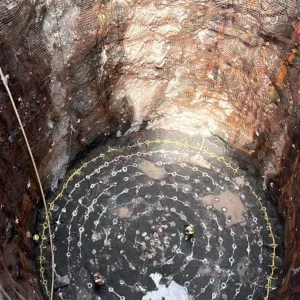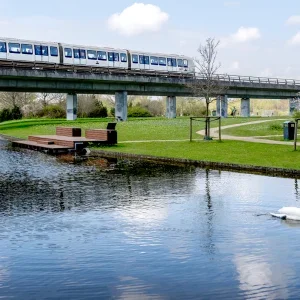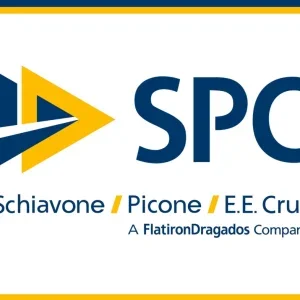VIP had previously been awarded the central section of the main tunnel and the Beckton shaft, and in total its share of the gasket supply is around 70%.
A spokesperson for VIP said of the gaskets, “VIP’s cast-in gasket is designed to eliminate cracking and spalling of concrete segments caused by solid corners. Solid corners result from the traditional ‘shot joining’ manufacturing process to join lengths of extruded gasket profile together to form the trapezoid gasket that encompasses the concrete segment.
As the gasket is unable to compress at the corners, higher loads are experienced which can lead to cracks and spalling.
“[The VIP] gaskets allow compression performance that is virtually uniform around the entire gasket, ensuring that loads experienced when the segments are closed together do not exceed the specification of the design.”
The 8.5m-diameter Tideway east section runs to depths between 45 and 65m, this is the deepest section of the tunnel where the ground is predominantly chalk. Due to these conditions, a 35mm profile is being used to cope with the higher water pressure at the deepest point of the tunnel. Gaskets are being supplied to a Max Bogl/Tarmac joint venture, which is casting the segments.
The 6.1m-diameter Greenwich connection tunnel will use a 28mm cast-in profile. The segments are also being cast by Max Bogl/Tarmac.
The 3.2m-diameter Frogmore connection tunnel will also use 28mm cast-in gaskets, and segments will be supplied by FP McCann.
The spokesperson added, “As a whole, the Thames Tideway Project is very significant for us and is a result of the investment we have made as a company in both the product development of our patented cast-in gasket along with the investment in manufacturing equipment and extra staff we have made in order to supply such projects. The fact that some of the sections have been phased at different times has meant we have had no issues with capacity and have been able to service these projects along with others that are in progress or due to commence.
“All product design, testing and manufacture takes place at our UK headquarters in Huntingdon. All of the rubber used for the gaskets is formulated by our in-house laboratory and compounded on site. It’s great to be involved in a British infrastructure project that is supporting British Manufacturing and jobs.”
Casting was due to begin in August as Tunnels and Tunnelling went to press.







